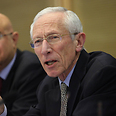
In last rate vote, Fischer sticks to policy
Bank of Israel's Monetary Committee decides to keep key rate for July unchanged at 1.25%. Outgoing central bank chief will be remembered as governor who maintained low interest rate policy, even when accused of pushing home prices up
It was the last interest rate decision made by outgoing Bank of Israel Governor Stanley Fischer, who will be remembered as a central bank chief who maintained a low interest rate policy, even when he was subject to harsh public criticism accusing him to pushing housing prices up.
When Fischer assumed the role, he had the exclusive authority to set the Bank of Israel's key rate. He is leaving office as chairman of the bank's Monetary Committee, which includes three senior central bank officials and three external economists, and sets the interest rate based on a vote.
Fischer took office in May 2005 when the Bank of Israel's key rate was 3.5%. At the time, the State of Israel was recovering from the economic crisis of the beginning of the 21st century, which followed the dot-com bubble burst in the United States and the Second Intifada. The economic reforms led by Finance Minister Benjamin Netanyahu in 2003 began leaving their mark, and growth rates reached record levels.
In the first year of his term Fischer stuck to a policy of consistently raising the interest rate in a bid to prevent inflationary pressures due to the increased growth. Until the summer of 2006, the Bank of Israel's key rate reached a record level of 5.5%. The trend changed later on, with the governor completing a move of reducing the interest rate to a level of 3.5% by the summer of 2007.
The policy change followed a significant appreciation of the shekel against the dollar, which negatively affected the profit of exporting factories and led to ongoing price reductions in the Israeli economy, which threatened to slow down its growth rate.
After a short "zigzagging" period, Fischer began consistently and dramatically lowering the interest rate at the end of 2008, in response to the financial crisis in the US which developed into a global economic depression that affected Israel as well. By April 2009, the interest rate reached the lowest rate in the State's history, 0.5%, staying there for half a year.
Failure of bi-monthly interest rate
Starting in August 2009, Fischer agreed to raise the interest rate slowly and moderately, after it became clear that the low interest led to inflated apartment prices. By October 2011, the interest rate had gone up to a level of 3.25%, followed by a trend of lowering the rate again on the backdrop of the slowdown in growth and the European debt crisis.
At the same time, the Bank of Israel's Monetary Committee began its work, and the governor was no longer the only person determining the interest rate level.
In early 2013, the central bank announced that it would not set new interest rates for May and September due to the Jewish holidays taking place those months and their tendency to affect the economic data used by decision makers. Accordingly, the Monetary Committee set the key rate for April and May 2013 at a level of 1.75%.
The decision to publish a bi-monthly interest rate during the Jewish holidays did not last even one month. In mid May, the Bank of Israel announced an immediate reduction of the interest rate to 1.5% due to interest rate reductions in Europe, which threatened to lead to a further appreciation of the shekel. At the end of the month, the Monetary Committee lowered the interest rate once again, to its current level of 1.25%.
Regardless of the decision made Monday, Fischer is leaving the Bank of Israel with a fairly low key rate. In the past two years he often defended his policy, arguing that without the low interest rate – unemployment in Israel would have been higher and economic growth would have been weak.
The low interest rate, Fischer said, had encouraged entrepreneurs to take loans in order to invest their money in business activity which creates workplaces.
His critics will argue that the low interest rate's contribution to the growth does not justify the heavy damage caused to the public as a result of the real estate bubble. The low interest rate policy led by Fischer made mortgages particularly cheap, allowing many Israelis to buy increasingly expensive apartments, hoping that the interest rate will remain low for long.
This situation led to an increase of dozens of percentage points in apartment prices, raising concerns that if lending rates go up too fast, many mortgage owners will not be able to pay off their debts and will lose their homes.
Fischer often responded to his critics by stating that the low interest rate was not the only cause of the inflated housing prices. According to the central bank chief, the Israeli government's planning and land marketing policy led to a very low supply of apartments compared to demands.
Until the end of his term, Fischer had urged the government to promote the construction of additional apartments, claiming that the Bank of Israel could not cover for the apartment shortage with a high interest rate, which would lead to an over-appreciation of the shekel and to a credit crunch in the business sector.










